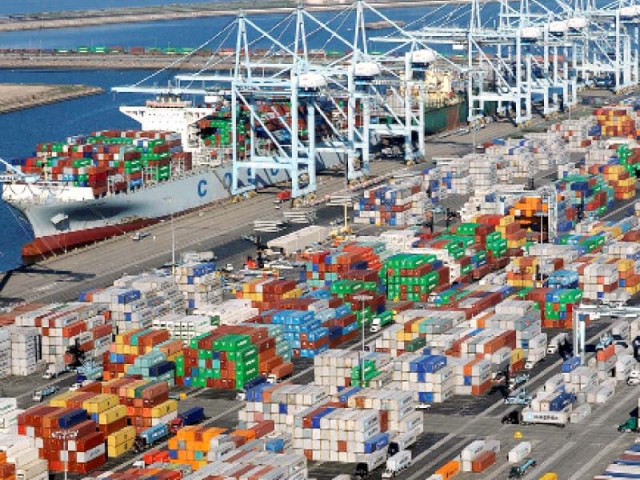10 items contribute 33% of import taxes
FBR collects Rs409b in taxes at import stage on petrol, gas, crude oil and others

The top 10 items - eight of them related to energy and edible oil - contributed one-third of import taxes, or Rs409 billion, in the first five months of current fiscal year, which was the key reason behind the constantly high prices of these commodities in Pakistan.
Federal Board of Revenue (FBR) data showed that the Rs409 billion revenues generated during the July-November 2021 period were 137% higher than the collection made in the same period of last fiscal year. This shows the impact of increase in tax rates, higher commodity prices and higher imports.
Prime Minister Imran Khan on last Sunday kept petrol prices unchanged at a record high of Rs146 per litre by increasing the tax rate by over Rs6 per litre.
During the July-November period of current fiscal year, the FBR collected Rs409 billion in taxes at the import stage on petrol, natural gas, crude oil (a new tax), high-speed diesel, bituminous coal, RBD palm oil, palm olein, furnace oil, seed and cotton, according to the FBR statistics.
Major differences were the imposition of 17% sales tax on crude oil, increase in customs duty on import of petrol from 5% to 10% and changing tax rates for palm oil.
The Rs409 billion revenues were equal to 33% of the total taxes of Rs1.2 trillion collected at the import stage over the past five months. They were 17.6% of the total tax collection of Rs2.3 trillion in the July-November period of FY22.
Data compiled by the FBR relating to duties and taxes collected at the import stage highlights heavy indirect taxes that are badly hurting consumers, particularly the lower income groups. Taxes that are paid on their domestic sales are over and above the collection of Rs409 billion.
Due to the increasing share of import taxes, the share of indirect taxes in the overall tax collection has gone up to 67%, which is hurting the poor and middle income groups more than the rich class.
Pakistan’s imports are also poised to significantly increase due to various factors like expansion in economic activities and high food imports because of a drop in their domestic production.
The central bank had projected $61 billion in imports for the current fiscal year but the commerce ministry estimated a record $72 billion in imports, which now seems a lower number.
Only in November, imports jumped to nearly $7.9 billion - the highest figure in the history of Pakistan.
On the back of record imports, the current account deficit widened to $5.1 billion in July-October 2021, which was 122% more than the annual deficit projection given in the Annual Plan 2021-22 by the Ministry of Planning and Development. This also reflects poorly on the government that cannot make realistic macroeconomic estimates.
The import of liquefied natural gas (LNG) was the biggest revenue spinner at the import stage.
The FBR collected Rs79 billion in taxes on gas import, higher by 176% or Rs50.3 billion over the same period of last year. The value of LNG/gas imports more than doubled to Rs322 billion.
Crude oil imports fetched over Rs71.5 billion in taxes at the import stage, up 588% or nearly Rs61 billion after the government slapped 17% GST on crude oil imports in the budget.
In the July-November period, the FBR collected Rs56.5 billion in taxes on the import of petrol on account of customs duty, sales tax and other taxes. It was higher by 50% or Rs19 billion. Petrol was the third highest revenue spinner at the import stage.
The collection of Rs42 billion in taxes on the import of high-speed diesel was the fourth largest revenue spinner at the import stage, which was higher by 93% or Rs20 billion.
These numbers suggest that import taxes were one of the key reasons behind the historically high petroleum product prices in Pakistan. The depreciation of the rupee against the US dollar was adding fuel to the fire.
Higher prices of diesel were also causing inflation due to increase in transport fares and the surge in agriculture production cost in areas where canal water was not available.
The transport group inflation increased over 24% during November over the same period of last fiscal year.
Bituminous coal import was the fifth highest revenue spinner at the import stage, bringing Rs40.2 billion worth of taxes, which were higher by Rs25.2 billion or 168%.
Palm olein imports generated Rs32 billion worth of taxes in five months, up 44% or Rs10 billion. Similarly, RBD palm oil imports fetched Rs29 billion, up 101% or Rs14.6 billion.
Various cooking oil brands have increased their prices to Rs390-410 per litre, which has affected every household, as the government failed to reduce duties and taxes on cooking oil despite making promise.
Furnace oil imports gave another Rs22.4 billion in taxes in the five-month period, higher by Rs15.2 billion or 210%.
Imports of seeds generated Rs19.4 billion in taxes for the government, up almost 100%. Cotton imports fetched Rs17 billion in revenues, higher by Rs11.7 billion or 219%.
Published in The Express Tribune, December 5th, 2021.
Like Business on Facebook, follow @TribuneBiz on Twitter to stay informed and join in the conversation.



















COMMENTS
Comments are moderated and generally will be posted if they are on-topic and not abusive.
For more information, please see our Comments FAQ